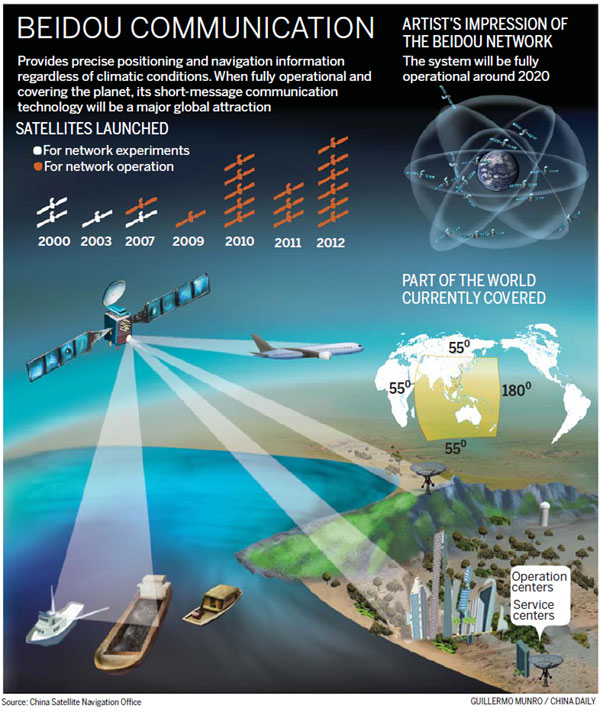Navigation system set to top the world
Updated: 2013-02-22 08:42
By Cheng Yingqi (China Daily)
|
||||||||
Chinese satellite communication network will challenge major rivals galileo and gps
China's fledgling satellite navigation system will soon benefit hundreds of millions of users around the world and provide a cheaper, and in some cases, better alternative to the Global Positioning System, say industry specialists.
The Beidou network has 16 navigation satellites hovering over the Asia-Pacific region, but global coverage will be achieved when the network has more than 30 satellites.
"By 2020, China will introduce a world-leading navigation system to more than 100 cities and 200 million users across the country," Vice-Minister of Science and Technology Cao Jianlin said.
Beidou has advantages, Cao said, over the three other global navigation systems - GPS of the United States, Europe's Galileo and Russia's Glonass - such as short-message communication.
According to statistics from the Chinese Ministry of Science and Technology, China's mobile users increased by 70 percent in 2009 and by 100 percent in 2010.
A 30 to 40 percent annual increase is expected over the next five years, which means the output of industries related to navigation services will be worth 225 billion yuan ($36 billion, 27 million euros) by 2015 and 400 billion yuan by 2020.
The military is already reaping the benefits of the new system even though it has not reached full capacity.
A naval fleet conducting patrols and training exercises in the South China Sea used Beidou earlier this month, according to a China National Radio report.
Beidou provided positioning, security and protection for the fleet, Lei Xiwei, information chief at the headquarters of the North Sea Fleet, said.
Li Changjiang, chief commander of the Beidou Navigation Satellite System, said the system can provide valuable intelligence, and its success is due in part to the technology behind the atomic clock. Atomic clocks are a crucial tool in navigation systems as their accuracy and stability are key requisites.
Only the United States and a few countries in Europe have mastered the technology, and Washington banned its export to China.
"It is the most complex technology in the system," Li added.
After Chinese scientists made a breakthrough in research, the Beidou system has a positioning accuracy of 10 meters.
In terms of performance, Beidou is comparable to GPS, Ran Chengqi, a spokesman for the China Satellite Navigation Office, said in December. The system's performance had been tested at Nyingchi airport in the Tibet autonomous region, which sits in a narrow valley between towering mountains. Without the navigation system, it is unlikely that planes would be able to land safely.
Also, in May 2008 when a devastating earthquake hit Wenchuan in Sichuan province and severed communication with the outside world, rescue teams carried Beidou navigation system handsets capable of sending and receiving 120 Chinese characters to communicate with their headquarters.
Li said that another important application of the Beidou system is in providing precision in transactions that require speed and accuracy, such as bank settlements.
Cao Hongjie, vice-president of UniStrong, a company involved in global navigation services, said Beidou will have broader applications than the GPS. "Compared with GPS, Beidou will make it easier for users to locate other people," Cao said.
One example is a locating system that can be installed on bicycles or carried by elderly people or children. Users can set a range of activities on the locator, and an alarm will be triggered if the monitored object goes offline.
In late January, the Beijing city government announced a plan to co-sponsor a public platform for the Beidou navigation system together with UniStrong. The public platform costs 300 million yuan and will begin serving the city's transportation and logistics system in June.
Transport companies will benefit by being able to keep track of vehicles, and can use the short message function to dispatch drivers more efficiently, Cao said.
China's transport ministry requires that 80 percent of all coaches, tourist buses and dangerous goods vehicles in nine provinces, autonomous regions and municipalities install the Beidou navigation system by the end of March, Xinhua News Agency reported.
However, Li Yi, a science observer, warns that excessive government support could make Beidou less competitive and the market will have the final say.
"Beidou's success should be proved by the market," Li Yi told China National Radio.
China has also opened Beidou for foreign users. On Dec 27, China published the Beidou interface control document, which describes how to access functions and services, and allows foreign companies to use the service.
Beidou, unlike other systems, is open and allows it to operate with other systems, Vice-Minister Cao said.
"We welcome international companies to develop client-side devices and services based on Beidou. We welcome the competition," he said.
chengyingqi@chinadaily.com.cn

(China Daily 02/22/2013 page3)

 Li Na on Time cover, makes influential 100 list
Li Na on Time cover, makes influential 100 list
 FBI releases photos of 2 Boston bombings suspects
FBI releases photos of 2 Boston bombings suspects
 World's wackiest hairstyles
World's wackiest hairstyles
 Sandstorms strike Northwest China
Sandstorms strike Northwest China
 Never-seen photos of Madonna on display
Never-seen photos of Madonna on display
 H7N9 outbreak linked to waterfowl migration
H7N9 outbreak linked to waterfowl migration
 Dozens feared dead in Texas plant blast
Dozens feared dead in Texas plant blast
 Venezuelan court rules out manual votes counting
Venezuelan court rules out manual votes counting
Most Viewed
Editor's Picks

|

|

|

|

|

|
Today's Top News
Boston bombing suspect reported cornered on boat
7.0-magnitude quake hits Sichuan
Cross-talk artist helps to spread the word
'Green' awareness levels drop in Beijing
Palace Museum spruces up
First couple on Time's list of most influential
H7N9 flu transmission studied
Trading channels 'need to broaden'
US Weekly

|

|







